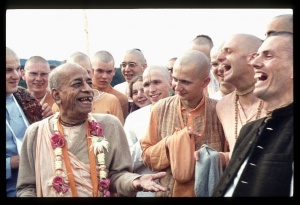CC Madhya 9.134: Difference between revisions
No edit summary |
(Vanibot #0054 edit - transform synonyms into clickable links, which search similar occurrences) |
||
| Line 17: | Line 17: | ||
<div class="synonyms"> | <div class="synonyms"> | ||
''bāhya-antare'' | ''[//vanipedia.org/wiki/Special:VaniSearch?s=bāhya&tab=syno_o&ds=1 bāhya]-[//vanipedia.org/wiki/Special:VaniSearch?s=antare&tab=syno_o&ds=1 antare]'' — externally and internally; ''[//vanipedia.org/wiki/Special:VaniSearch?s=gopī&tab=syno_o&ds=1 gopī]-[//vanipedia.org/wiki/Special:VaniSearch?s=deha&tab=syno_o&ds=1 deha]'' — the body of a ''gopī''; ''[//vanipedia.org/wiki/Special:VaniSearch?s=vraje&tab=syno_o&ds=1 vraje]'' — in Vrajabhūmi; ''[//vanipedia.org/wiki/Special:VaniSearch?s=yabe&tab=syno_o&ds=1 yabe]'' — when; ''[//vanipedia.org/wiki/Special:VaniSearch?s=pāila&tab=syno_o&ds=1 pāila]'' — they got; ''[//vanipedia.org/wiki/Special:VaniSearch?s=sei&tab=syno_o&ds=1 sei] [//vanipedia.org/wiki/Special:VaniSearch?s=dehe&tab=syno_o&ds=1 dehe]'' — in that body; ''[//vanipedia.org/wiki/Special:VaniSearch?s=kṛṣṇa&tab=syno_o&ds=1 kṛṣṇa]-[//vanipedia.org/wiki/Special:VaniSearch?s=saṅge&tab=syno_o&ds=1 saṅge]'' — with Kṛṣṇa; ''[//vanipedia.org/wiki/Special:VaniSearch?s=rāsa&tab=syno_o&ds=1 rāsa]-[//vanipedia.org/wiki/Special:VaniSearch?s=krīḍā&tab=syno_o&ds=1 krīḍā]'' — pastimes of the ''rāsa'' dance; ''[//vanipedia.org/wiki/Special:VaniSearch?s=kaila&tab=syno_o&ds=1 kaila]'' — performed. | ||
</div> | </div> | ||
Latest revision as of 00:02, 20 February 2024
Śrī Caitanya-caritāmṛta - Madhya-līlā - Chapter 9: Lord Śrī Caitanya Mahāprabhu's Travels to the Holy Places

His Divine Grace
A.C. Bhaktivedanta Swami Prabhupada
A.C. Bhaktivedanta Swami Prabhupada
TEXT 134
- bāhyāntare gopī-deha vraje yabe pāila
- sei dehe kṛṣṇa-saṅge rāsa-krīḍā kaila
SYNONYMS
bāhya-antare — externally and internally; gopī-deha — the body of a gopī; vraje — in Vrajabhūmi; yabe — when; pāila — they got; sei dehe — in that body; kṛṣṇa-saṅge — with Kṛṣṇa; rāsa-krīḍā — pastimes of the rāsa dance; kaila — performed.
TRANSLATION
“The personified authorities on the Vedic hymns acquired bodies like those of the gopīs and took birth in Vrajabhūmi. In those bodies they were allowed to enter into the Lord’s rāsa-līlā dance.